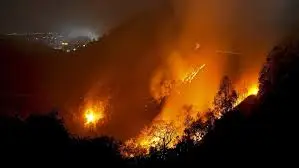Forest fire trigger landmine blasts along LoC in Poonch

A sudden forest fire along the Line of Control (LoC) in Poonch district, Jammu and Kashmir, sparked multiple landmine explosions. This raised serious concerns about safety, environmental damage, and the region’s fragile security.
The Incident and Immediate Aftermath
On [insert recent date], a large forest fire broke out near the LoC in Poonch. Dry weather and strong winds helped the flames spread quickly across thick forests. As the fire moved forward, it triggered several landmine blasts. These mines were planted decades ago as part of security measures to stop infiltration.
The explosions were loud and could be heard in nearby villages. Local residents were alarmed and fearful. The Indian Army and the Jammu and Kashmir Forest Department responded quickly to control the fire and check the damage. Thankfully, no injuries or deaths were reported. However, the event highlighted the dangers that landmines still pose in forested border areas, especially during natural disasters.
The Legacy of Landmines Along the LoC
The LoC has long been a militarized zone dividing Indian-administered Jammu and Kashmir from Pakistan-administered territory. Both sides planted thousands of landmines to prevent militant crossings. These mines serve a military purpose, but they also remain a hazard to people living nearby.
Landmines can be hard to detect and remove. Many stay unexploded for years, risking accidents for security forces and civilians. In Poonch, mines lie buried in difficult terrain, making clearance slow and risky.
The forest fire showed how fragile this situation is. Heat from the flames set off many mines. These blasts can cause fires to spread further and pose immediate risks to anyone nearby.
Environmental Impact of Fires and Mines
Forest fires cause serious damage to the environment in Poonch. The district has rich biodiversity, with many plants and animals depending on its forests. The fire destroyed large areas of this habitat, putting wildlife at risk.
Fires also harm soil quality and increase erosion. This affects local water sources and farming. Loss of vegetation reduces the forest’s ability to absorb carbon, which adds to climate concerns.
Landmines make firefighting harder. The risk of detonating mines limits where firefighters can go and what equipment they can use. Sometimes, they have to wait for security forces to clear mines before entering, which delays fire control and lets the blaze spread.
Security Concerns and Strategic Implications
The incident has serious security implications. The LoC is one of the world’s most heavily guarded borders. While landmines help block enemy movement, they also restrict the Indian Army’s actions and affect local communities.
Mine blasts during fires cause confusion and strain resources. Security personnel must manage both firefighting and mine clearance at once. This division can be exploited by militants.
There is also a growing risk of accidents. With many mines still unexploded, fires and blasts raise the chance of injury for soldiers and civilians. The mix of natural disasters and war remnants creates a dangerous environment.
Response Measures and Future Directions
After the fire and explosions, the Indian Army and Forest Department stepped up efforts. The Army sent mine detection teams to find and disarm unexploded mines. Firefighters used controlled burns and water drops to limit the blaze, avoiding further blasts.
Authorities also warned nearby residents and started evacuation plans. Experts suggest several steps to prevent future incidents:
- Expand Demining: Increase efforts to clear mines with modern tech and more manpower.
- Cross-Border Cooperation: India and Pakistan should try to coordinate fire management near the LoC.
- Early Warning Systems: Use satellites and drones to detect fires early.
- Community Education: Teach locals about mine safety and fire prevention.
- Forest Management: Promote reforestation and sustainable practices to reduce fire risks.
The Human Dimension
Local people in Poonch face multiple dangers daily. Landmines, fires, and border tensions create constant stress. Villagers rely on the forest for their livelihood but fear explosions and fires.
Hearing blasts and seeing fires often cause fear and trauma. Many residents urge authorities to act swiftly to protect them and support long-term safety.
Conclusion
The forest fire that set off landmine explosions in Poonch highlights complex challenges. It shows how environmental hazards and security threats can collide in conflict zones.
The fire is now controlled, but the event signals the need for better border management. Authorities must clear mines, improve disaster response, and encourage cooperation. Balancing safety and environment is key to lasting peace in Jammu and Kashmir.
By addressing these challenges, India can protect its citizens and natural resources while maintaining security. This is crucial for a stable and secure future in the region.






